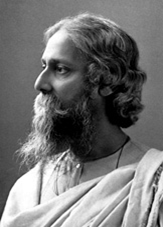Rabindranath Tagore was an important figure in the Indian freedom struggle and served an inspiration to many. In this article, you can read about his life and contributions to the IAS Exam.
| In addition, the following links given below will also help in strengthening the candidate’s exam preparation: |
Rabindranath Tagore Biography
Rabindranath Tagore, also called ‘Gurudev’ passed away on 7 August 1941 at Jorasanko, Calcutta in his ancestral home. He was 80.

- Rabindranath Tagore was born on 7 May 1861 to an upper-class Bengali family in his ancestral home in Calcutta.
- He became the most influential writer, poet and artist in Bengal and also India in the early 20th century
- He was a polymath and his mastery spread over many arenas like art, literature, poetry, drama, music and learning.
- He became the first non-European to win the Nobel Prize for Literature when he won the award in 1913 for his translation of his own work in Bengali, Gitanjali. He was the first non-white person to win a Nobel Prize.
- Tagore is said to have composed over 2000 songs and his songs and music are called ‘Rabindrasangeet’ with its own distinct lyrical and fluid style.
- The national anthems of both India and Bangladesh were composed by Tagore. (India’s Jana Gana Mana and Bangladesh’s Amar Shonar Bangla.)
- The Sri Lankan national anthem is also said to have been inspired by him.
- Tagore had composed Amar Shonar Bangla in 1905 in the wake of the Bengal partition to foster a spirit of unity and patriotism among Bengalis. He also used the Raksha Bandhan festival to bring about a feeling of brotherhood among Bengal’s Hindus and Muslims during the partition of 1905. He was fiercely opposed to the partition.
- His poems and songs infuse people with a feeling of patriotism and love for the motherland. His novels, dances, dramas, essays, dance-dramas and stories cover a wide range of topics from personal to political.
- He was knighted by the British government in 1915. But he later renounced it protesting against the Jallianwala Bagh Massacre (Read more on this massacre on ‘This Day in History’ dated 13 April 1919).
- Tagore wrote his first poetry aged 8. He published his first poems aged 16 under the pen name ‘Bhanusimha’.
- Tagore is responsible for modernising Bengali prose and poetry. His notable works include Gitanjali, Ghare-Baire, Gora, Manasi, Balaka, Sonar Tori, He is also remembered for his song ‘Ekla Chalo Re’.
- He was also called the ‘Bard of Bengal’.
- In 1921, he founded the Vishwabharati University at Santiniketan. He was staunchly against the classroom kind of education. He believed it stifled creativity. He conceived of an educational system where the students’ curiosity was kindled and learning became more natural.
- He was a widely travelled person and had been to over 30 countries in 5 different continents. He met many other eminent personalities like Albert Einstein, Romain Rolland, Robert Frost, G B Shaw, Thomas Mann, etc.
- He had spoken at the World Parliament for Religions in the years 1929 and 1937.
- His stories and songs continue to inspire many Indians even today.
- Tagore’s birth anniversary is celebrated by Bengalis all over the word as Rabindra Jayanti. It is marked on the 25th day of the Bengali month of Boisakh (falls in early May in the Gregorian calendar). It is celebrated in Bangladesh also.
- Tagore has given beautiful quotes which are relevant even today. Some of them are given below:
“I slept and dreamt that life was joy. I awoke and saw that life was service. I acted and behold, service was joy.”
“You can’t cross the sea merely by standing and staring at the water.”
“Don’t limit a child to your own learning, for he was born in another time.”
“If you shut the door to all errors, truth will be shut out.”
Rabindranath Tagore:- Download PDF Here
Familiarise yourself with the exam pattern by visiting the UPSC Syllabus page. For more preparation materials and related articles refer to the links given in the table below:
Related Links

Comments